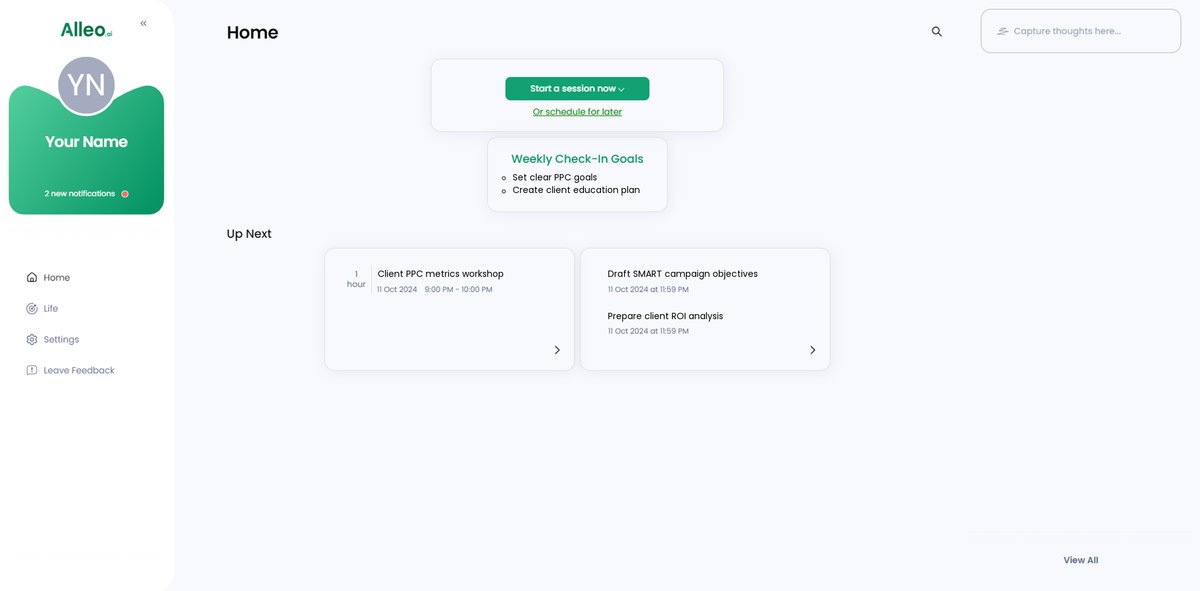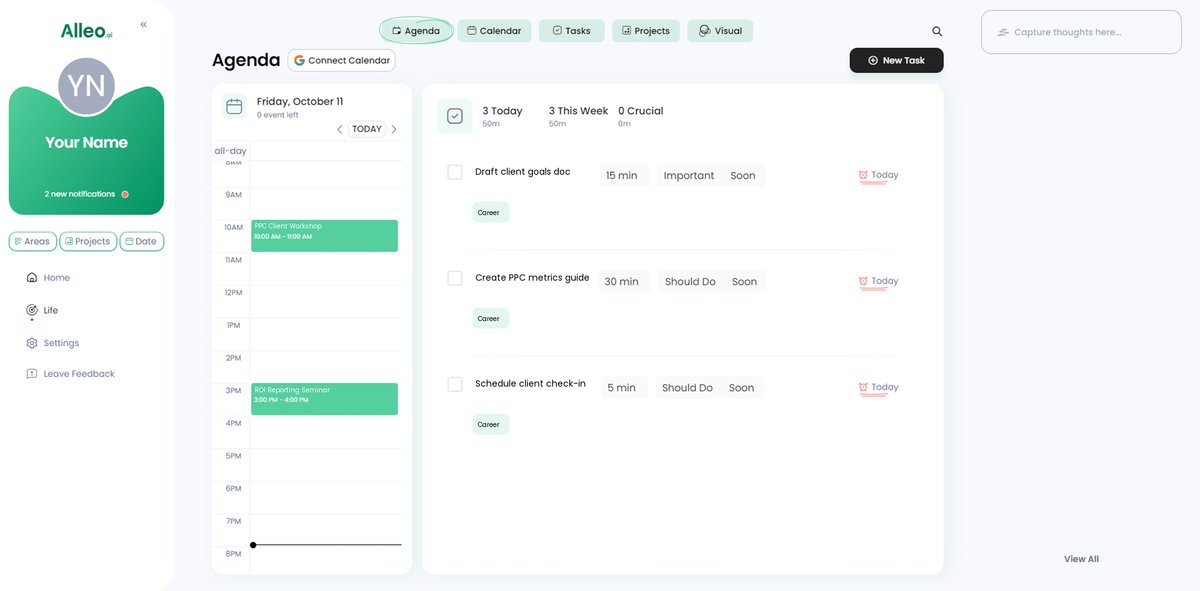7 Proven Strategies for PPC Managers to Effectively Manage Client Expectations
Are you constantly battling the challenge of managing PPC client expectations in your campaigns?
As a life coach, I’ve helped many professionals navigate these challenges. In my experience, managing client expectations, especially when it comes to setting realistic PPC goals and demonstrating PPC ROI to clients, is a common struggle.
In this article, you’ll discover actionable strategies for managing PPC client expectations, including how to set realistic goals, educate clients on PPC metrics, and provide transparent performance reports. We’ll also touch on client communication in PPC and handling PPC setbacks.
Let’s dive into these essential aspects of managing PPC client expectations.

Understanding the Complexities of Client Expectations in PPC Campaigns
Managing PPC client expectations is notoriously challenging. Several factors can impact PPC performance, including market fluctuations, competitive actions, and algorithm updates.
These elements are often outside your control, making it difficult to guarantee consistent results when setting realistic PPC goals.
Many clients initially struggle with the unpredictability of PPC outcomes. They expect immediate results and get frustrated when PPC campaign timelines indicate campaigns take time to optimize.
This leads to dissatisfaction and strained relationships, affecting client communication in PPC.
In my experience, it’s crucial to address these challenges head-on. By understanding the intricacies of PPC and communicating them effectively, you can better manage PPC client expectations and foster trust.

A Roadmap to Managing Client Expectations in PPC Campaigns
Overcoming this challenge requires a few key steps. Here are the main areas to focus on to make progress in managing PPC client expectations.
- Set clear, realistic goals with clients upfront: Collaborate on SMART goals and document them, aligning PPC strategies with client objectives.
- Educate clients on PPC metrics and timelines: Conduct workshops and share resources to improve client communication in PPC.
- Provide regular, transparent performance reports: Send monthly PPC performance reporting and offer dashboard access.
- Establish a consistent communication schedule: Schedule regular check-ins and keep open communication lines for managing PPC client expectations.
- Demonstrate value through case studies and ROI data: Present case studies and ROI calculations, demonstrating PPC ROI to clients.
- Manage budget expectations proactively: Plan budgets realistically and conduct cost-benefit analyses for managing PPC budget expectations.
- Create a troubleshooting plan for performance dips: Monitor proactively and develop contingency plans for handling PPC setbacks.
Let’s dive in to explore these strategies for managing PPC client expectations!
1: Set clear, realistic goals with clients upfront
Setting clear, realistic goals with clients upfront is crucial for managing PPC client expectations and ensuring mutual understanding.
Actionable Steps:
- Collaborate on SMART goals: Work with clients to define Specific, Measurable, Achievable, Relevant, and Time-bound goals for PPC campaigns, aligning PPC strategies with client objectives.
- Manage expectations: Discuss the feasibility of achieving these goals within the given PPC budget expectations and campaign timelines to ensure transparency.
- Document agreements: Ensure all agreed goals are documented and signed off by both parties to avoid future misunderstandings and establish PPC success benchmarks.
Explanation:
These steps matter because they help create a solid foundation for the campaign, enhancing trust and clarity in client communication in PPC. By collaborating on SMART goals, you ensure that both parties have a clear understanding of what success looks like when managing PPC client expectations.
Managing expectations upfront prevents unrealistic demands and potential conflicts. Documentation serves as a reference point, ensuring accountability and facilitating PPC performance reporting.
According to Matchcraft, setting clear goals is essential for effective PPC management.
Key benefits of setting clear goals:
- Aligns client and agency expectations
- Provides a measurable benchmark for success, aiding in demonstrating PPC ROI to clients
- Facilitates more focused and effective campaigns
This initial alignment paves the way for a smoother campaign process, better client relationships, and sets the stage for educating clients on PPC metrics and handling PPC setbacks.

2: Educate clients on PPC metrics and timelines
Educating clients on PPC metrics and timelines is crucial for managing PPC client expectations and fostering trust.
Actionable Steps:
- Conduct educational workshops: Organize workshops to explain key PPC metrics like Click-Through Rate (CTR), Return on Investment (ROI), and conversion rates, focusing on setting realistic PPC goals.
- Share informative resources: Provide clients with easy-to-understand guides and resources on PPC metrics and typical PPC campaign timelines for results.
- Send regular updates: Keep clients informed about the algorithm’s learning phase and expected timescales for significant results, enhancing client communication in PPC.
Explanation:
These steps matter because they help clients understand the complexities and timelines involved in PPC campaigns. By educating clients on PPC metrics, you set realistic expectations and build trust.
For instance, according to Matchcraft, effective education can significantly improve client relationships and campaign outcomes, aiding in demonstrating PPC ROI to clients.
With these approaches, you can ensure your clients are well-informed and reassured about the process of managing PPC client expectations.

3: Provide regular, transparent performance reports
Providing regular, transparent performance reports is essential for managing PPC client expectations and building trust in PPC campaigns.
Actionable Steps:
- Send detailed monthly reports: Highlight key metrics and progress towards agreed goals in a clear and concise manner, demonstrating PPC ROI to clients.
- Offer live dashboard access: Give clients access to a real-time dashboard for monitoring PPC campaign performance and educating clients on PPC metrics.
- Include contextual explanations: Explain significant changes or trends observed in the reports to provide context and clarity, aiding in client communication in PPC.
Explanation:
These steps matter because they help clients understand the ongoing progress and effectiveness of their PPC campaigns. By offering detailed monthly reports and live dashboard access, clients stay informed and can see the value generated, which is crucial for managing PPC client expectations.
Including contextual explanations ensures that clients grasp the reasons behind performance fluctuations. According to StrategyBeam, regular and transparent reporting is crucial for maintaining long-term client relationships and setting realistic PPC goals.
Essential elements of effective performance reports:
- Clear visualization of key metrics
- Comparison to previous periods and PPC success benchmarks
- Actionable insights and recommendations for aligning PPC strategies with client objectives
Regular updates foster trust and keep clients engaged with the campaign’s progress, helping in managing PPC budget expectations and PPC campaign timelines.

4: Establish a consistent communication schedule
Establishing a consistent communication schedule is crucial for managing PPC client expectations and maintaining client relationships in PPC campaigns.
Actionable Steps:
- Schedule regular check-ins: Arrange weekly or bi-weekly meetings to discuss PPC campaign performance and address any concerns.
- Ensure open communication channels: Maintain open lines of communication for any urgent queries or issues that may arise, facilitating client communication in PPC.
- Implement a feedback loop: Create a system for clients to provide feedback on the communication process and make necessary adjustments to align PPC strategies with client objectives.
Explanation:
These steps matter because they help keep clients informed and engaged with the PPC campaign’s progress. Regular check-ins and open communication channels foster trust and transparency, which are essential for managing PPC client expectations.
According to StrategyBeam, consistent communication is essential for long-term client relationships. Implementing a feedback loop ensures continuous improvement and client satisfaction, helping in setting realistic PPC goals and managing PPC budget expectations.
This approach ensures that clients feel supported and informed, reducing potential frustrations and facilitating effective PPC performance reporting.

5: Demonstrate value through case studies and ROI data
Demonstrating value through case studies and ROI data is vital for managing PPC client expectations and showcasing PPC campaign success.
Actionable Steps:
- Present case studies: Share relevant case studies that highlight successful campaigns and their measurable impact, effectively demonstrating PPC ROI to clients.
- Update ROI data: Regularly update clients with ROI figures to show the tangible value generated by PPC efforts, aligning PPC strategies with client objectives.
- Highlight testimonials: Showcase client testimonials that reinforce the effectiveness of your PPC strategies and success benchmarks.
Explanation:
These steps matter because they help clients see the real-world impact of your PPC management. By presenting case studies and ROI data, you provide concrete evidence of your success and build trust, which is crucial for managing PPC client expectations.
For example, according to Flying V Group, showcasing case studies significantly boosts client confidence and satisfaction.
This approach reassures clients and strengthens your relationship, paving the way for long-term collaboration in managing PPC budget expectations and performance reporting.

6: Manage budget expectations proactively
In the world of PPC campaigns, proactively managing PPC budget expectations is crucial for maintaining client trust and effectively managing PPC client expectations.
Actionable Steps:
- Discuss and agree on a realistic budget: Collaborate with clients to align the budget with campaign goals and expected outcomes, focusing on setting realistic PPC goals.
- Conduct a cost-benefit analysis: Provide an analysis to justify the proposed budget and illustrate the potential return on investment, demonstrating PPC ROI to clients.
- Set up flexible budgeting: Implement a flexible plan that allows for adjustments based on performance and market conditions, aligning PPC strategies with client objectives.
Explanation:
These steps matter because they help set clear financial expectations, preventing future disputes and ensuring transparency in client communication in PPC. By conducting a cost-benefit analysis, you provide clients with a clear understanding of the value their investment will bring.
According to Matchcraft, realistic budgeting is essential for effective PPC management and client satisfaction.
Key factors to consider in PPC budgeting:
- Industry competition and average CPCs
- Seasonal trends and market fluctuations
- Client’s overall marketing goals and resources
Effectively managing PPC client expectations and budgets builds trust and positions you as a proactive, reliable partner in handling PPC setbacks and achieving PPC success benchmarks.

7: Create a troubleshooting plan for performance dips
Creating a troubleshooting plan for performance dips is essential to maintain client trust and ensure campaign success when managing PPC client expectations.
Actionable Steps:
- Implement proactive monitoring: Continuously monitor campaign performance to detect potential issues early and address them promptly, aligning PPC strategies with client objectives.
- Develop contingency plans: Prepare plans for common issues such as keyword performance drops or algorithm changes to ensure quick recovery and demonstrate PPC ROI to clients.
- Reassure clients: Share the troubleshooting plan with clients to build confidence and demonstrate your commitment to maintaining performance, enhancing client communication in PPC.
Explanation:
These steps matter because they help you quickly address any performance drops, ensuring client satisfaction. By proactively monitoring and preparing contingency plans, you minimize disruptions and maintain campaign effectiveness, setting realistic PPC goals.
According to Matchcraft, having a solid troubleshooting plan is crucial for managing PPC campaigns effectively. This approach reassures clients and enhances your reliability as a PPC manager, helping in handling PPC setbacks.

Partner with Alleo to Manage Client Expectations
We’ve explored the challenges of managing PPC client expectations in campaigns. Did you know you can work directly with Alleo to make this journey of setting realistic PPC goals easier and faster?
Start by setting up an Alleo account. Create a personalized plan to match your specific needs for managing PPC budget expectations and campaign timelines.
Alleo’s AI coach provides tailored coaching support for client communication in PPC, just like a human coach.
With Alleo, you get full coaching sessions on handling PPC setbacks, progress tracking, and accountability via text and push notifications. Plus, enjoy a free 14-day trial with no credit card required to start demonstrating PPC ROI to clients.
Ready to get started for free and learn about aligning PPC strategies with client objectives? Let me show you how!
Step 1: Log In or Create Your Account
To begin managing your PPC client expectations with Alleo’s AI coach, log in to your account or create a new one if you haven’t already.

Step 2: Choose Your Focus Area
Select “Setting and achieving personal or professional goals” to align your PPC management skills with clear objectives, mirroring the importance of goal-setting in client relationships as discussed in the article.

Step 3: Select “Career” as Your Focus Area
Choose “Career” as your focus area in Alleo to get tailored guidance on managing client expectations in PPC campaigns, helping you improve your professional relationships and performance in digital marketing.

Step 4: Starting a coaching session
Begin your journey with Alleo by scheduling an intake session, where you’ll discuss your PPC client management challenges and create a personalized plan to improve your strategies and communication skills.

Step 5: Viewing and managing goals after the session
After your coaching session, check the Alleo app’s home page to review and manage the PPC campaign goals you discussed, ensuring you stay aligned with your client expectations and can track progress effectively.

Step 6: Adding events to your calendar or app
Use Alleo’s calendar and task features to schedule and track your progress in managing client expectations for PPC campaigns, ensuring you stay on top of regular check-ins, performance reports, and educational workshops.

Wrapping Up: Mastering Client Expectations with Confidence
This journey has been about mastering the art of managing PPC client expectations in campaigns. You’ve learned actionable strategies to set realistic PPC goals, educate clients on PPC metrics, and provide transparent PPC performance reporting.
Remember, clear client communication in PPC and proactive management are key. Consistent updates and transparent practices build trust and keep clients satisfied, especially when managing PPC budget expectations and campaign timelines.
Ultimately, it’s about fostering strong relationships and demonstrating PPC ROI to clients. Now, it’s time to implement these strategies for handling PPC setbacks and see the positive impact on aligning PPC strategies with client objectives.
Ready to take your PPC management to the next level? Partner with Alleo for tailored coaching and support in managing PPC client expectations. Try it for free and transform your client relationships today.